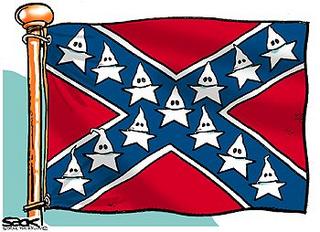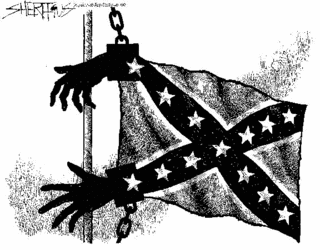 I saw the Dukes of Hazzard the other day. Yeah, I know-lame-but it wasn't bad...it wasn't good either. It was more like the Blue-state attempt at making a Red-state movie. Hence, the Dukes came off as hellraising, mindless rednecks, and every female in the movie was a sex-crazy cowgirl whose clothes couldn't keep a tick mouse warm. But that's not what I wanted to talk about. They had the guts to put the flag on the roof of the General Lee. Sure, it wasn't the Dukes' idea to put it on the car, and, yes, they quake stereotypically at some black men's threats,--but I was amazed they even put it in. I thought it would be like a mini-version of what we all, while gritting our teeth, misleadingly call "the Flag Debate."
I saw the Dukes of Hazzard the other day. Yeah, I know-lame-but it wasn't bad...it wasn't good either. It was more like the Blue-state attempt at making a Red-state movie. Hence, the Dukes came off as hellraising, mindless rednecks, and every female in the movie was a sex-crazy cowgirl whose clothes couldn't keep a tick mouse warm. But that's not what I wanted to talk about. They had the guts to put the flag on the roof of the General Lee. Sure, it wasn't the Dukes' idea to put it on the car, and, yes, they quake stereotypically at some black men's threats,--but I was amazed they even put it in. I thought it would be like a mini-version of what we all, while gritting our teeth, misleadingly call "the Flag Debate." But it was part of the history!
Yes, but it was racist then and now--Wait--are we talking about the General Lee or the Georgia Flag?
In the South there is no debate. Everybody's afraid to talk about it. They change the subject, they feign disinterest.  You might as well try to whip up a debate about proper table-manners for cannibals. There is hate on both sides. See, one thing that a lot of people don't get is that many feel the Confederate Flag is the same as the Swastika. If that were true we need to tear down the memorials, redo Stone Mountain, and kick over the graves. But it isn't true. Look, slavery is evil, but not everyone that ever owned a slave is Hitler. I'm sure that it is useless to point out that slavery, in history, has been the rule, not the exception. Regardless of fact of life that slavery presented, not everyone that lived in the Old South owned a slave. Most of the poor SOB's that fought in the Civil War didn't own crap--much less other human being. So was the war about slavery? And do we remember evil when we display the Confederate Flag?
You might as well try to whip up a debate about proper table-manners for cannibals. There is hate on both sides. See, one thing that a lot of people don't get is that many feel the Confederate Flag is the same as the Swastika. If that were true we need to tear down the memorials, redo Stone Mountain, and kick over the graves. But it isn't true. Look, slavery is evil, but not everyone that ever owned a slave is Hitler. I'm sure that it is useless to point out that slavery, in history, has been the rule, not the exception. Regardless of fact of life that slavery presented, not everyone that lived in the Old South owned a slave. Most of the poor SOB's that fought in the Civil War didn't own crap--much less other human being. So was the war about slavery? And do we remember evil when we display the Confederate Flag?
Yup.
The Civil war was about slavery, though it wasn't that the end of slavery was going to free blacks. The big thing was the money, right? The loss of a practice in which the entire regional economy was based? However, that can't possibly excuse the practice. Slavery is a scar on America. Brother enslaving  brother led to brother killing brother. Shouldn't everyone that calls themselves American remember the evil that nearly destroyed the dream? Shouldn't it be a tragedy? Something not easy. Not good guys versus bad guys, but an impossible situation that swept up people doing what they thought they had to do? Is the CSA soldier defending his home pure evil, is the Union Soldier burning his way through a defeated country pure good? The Georgia Flag included the stars and bars in the 50's for segregationist reasons; its not like the people that raise the flag are all enlightened historians of American History. Yet, when a great grand-child puts a confederate battle flag on a grave of a fallen soldier is that great grand-child "worse than Hitler?" I really don't think such a sentiment is solely about "sticking it to the blacks."
brother led to brother killing brother. Shouldn't everyone that calls themselves American remember the evil that nearly destroyed the dream? Shouldn't it be a tragedy? Something not easy. Not good guys versus bad guys, but an impossible situation that swept up people doing what they thought they had to do? Is the CSA soldier defending his home pure evil, is the Union Soldier burning his way through a defeated country pure good? The Georgia Flag included the stars and bars in the 50's for segregationist reasons; its not like the people that raise the flag are all enlightened historians of American History. Yet, when a great grand-child puts a confederate battle flag on a grave of a fallen soldier is that great grand-child "worse than Hitler?" I really don't think such a sentiment is solely about "sticking it to the blacks."
I've lived up North. Up there it's easy. They're the good guys, we're the bad. Carpetbaggers were northern schoolteachers that came to teach blacks how to read. Anyone that would even entertain the idea of looking at a Confederate Flag is evil beyond all comprehension. Walter Williams might disagree with that (and also maybe--since support for the flag from Kerry is not overwhelming--the obviously conflicted fellow who created this election display on the right)
I really don't care what's on the flag. I'm bored by any so-called "debate" where it's just race-baiting and score settling. You know a flag is a symbol. And we can change the symbol, but if the symbolism is the same what have we really changed? A lot of people want to forget about it; some believe that by tearing down the flag we'll strike a blow against the evil people. I think both those paths lead to ignoring the humanity of the story. You shouldn't forget the flag, and you shouldn't hate the flag. Like our all American History we have to live with it. I'm not sure if we can. Hell, maybe I'm wrong and we could just hide it behind the boxes and old picture-frames. Maybe we should blast old Jackson's face right off the mountain. I always wondered if we could change the flag. Change the colors. Change the symbols. Change the meaning. What if the bars were black for the stain of slavery, the horror and evil of our past? What if the  background was blood-red for the losses on all sides. And what if there was one star, the star of hope, to lead us to the future that we all share? I don't care what happens with the flag, but it seems like hating anybody that disagrees with you just leads to division and fear. What do you think? Oh, wait, wait--I know, I know...I am worse than Hitler!
background was blood-red for the losses on all sides. And what if there was one star, the star of hope, to lead us to the future that we all share? I don't care what happens with the flag, but it seems like hating anybody that disagrees with you just leads to division and fear. What do you think? Oh, wait, wait--I know, I know...I am worse than Hitler!
Bring the hate mail on! I can't wait!
ReplyDeleteUp here in Athens we have the largest, oldest GA graveyard which contains the tomb of the unknown confederate soldier.
ReplyDeleteOn Confederate Memorial Day, the daughters of the confederacy plant small flags on the graves of the men who fought or died in the war.
All those flags at once give you a strong sense of the terror the civil war brought. The graveyard is right behind the stadium atthe University.
Do you think a professor will ever take a civil war class to the graveyard on this day to witness what a loss of life the war brought?
Not if he doesn't want to be publically charged with bigotry.
I read an interesting book by Robert Fogel called Time on the Cross in which he argues that slavery was not economically sustainable. That's not the point of your post, but it brought something to mind:
ReplyDeleteThe American Civil War did not begin because of slavery. It was an issue, but not the main one. To tie the Confederate flag to slavery is disingenuous, especially because DC, Maryland, Kentucky, and West Virginia all kept their slaves right up until 1865. The Emancipation Proclaimation only freed slaves in the South, if I remember correctly.
Also, I heard that Indiana was going to go Confederate, so the state's governor, Lew Wallace, disbanded the legislature so that they couldn't vote to join the Confederacy. That was all fine and dandy until Wallace realized that there was no way he could finance the state budget without passing legislation. So, a bunch of wealthy Hoosiers (and perhaps out-of-staters, too) financed Indiana during the interim.
Wouldn't that have been interesting? To have a none slave state as part of the Confederacy. However, Crawfordsville, IN being the headquarters of the Klan does not help in making the "Confederacy is not about racism" case.
Sorry, Lew Wallace was not the governor. Oliver Hazard Perry Morton was. Morton was a virulent Republican.
ReplyDeleteWallace was a Union general from Indiana who also penned Ben Hur: A Tale of the Christ.
But it is not that the Civil War is about just slavery, but that slavery is was one of those big dividing factors from the inception of the country. Slavery was a cause, a big cause, of so much of the politics and economics and ideology that led to the Civil War. But your point is not lost on me.
ReplyDelete